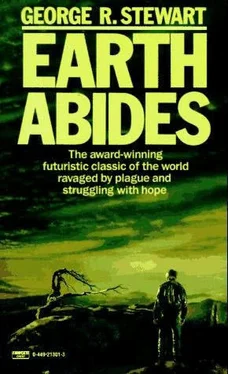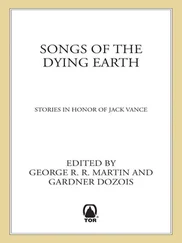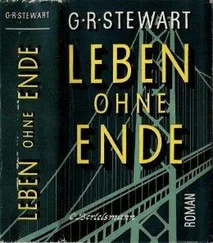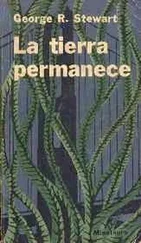Now he lay by himself in the old and half-ruined house. The others slept in other houses, or in good weather lay in the open. Perhaps they felt that ghosts walked in this old house. Well, perhaps! To Ish himself the thoughts of those who had been long dead were often more immediately present than the bodies of those now living.
Though he had no clock, the half-light told him that the time could not be much before sunrise. Perhaps he had slept as long as an old man needed to sleep. He would lie there, turning himself over occasionally, until the sun had risen, and someone—he hoped it would be the young man called Jack—came to bring him his breakfast. There would be a well-braised beef bone on which he could suck, and some corn-meal boiled into a mush. The Tribe took good care of him, an old man. They let him have corn-meal though that was something of a rarity with them. They sent someone to carry his hammer and help him outdoors, so that he could sit on the hillside when there was sunshine. Often the one who came to help him was Jack. Yes, they took very good care of him, even though he was a useless old man. Sometimes they grew angry with him and pinched him, but that was only because they thought he was a god.
The wind still blew, and the branches brushed and slapped against the house. But he had apparently not slept as much as he needed to sleep, and after a while he drowsed off, in spite of the noises.
The cuts in the hills and the long embankments for the roads—they will still show as narrow valleys and ridges even after ten thousand years have passed. The great masses of concrete that were the dams—they will remain like the dikes of the granite itself.
But the steel and the wood will pass quickly. The three fires will take them.
Slowest of all is the fire of rust that burns at the steel. Yet give it some short centuries, and the high trestle that spans the canyon will be only a line of red soil on the slopes below.
Faster by far is the fire of decay that feeds on the wood.
But fastest of all is the fire of the flames.
Then suddenly someone was shaking him hard. He awoke with a great shock. As he focused his old eyes, he saw that the person who was shaking him was the young man named Jack, and that Jack’s face was tense with fear.
“Get up! Get up quick!” Jack was saying. With the shock of the sudden awakening, Ish’s mind seemed clearer than before, and both his body and his mind reacted faster. He moved quickly, pulling on some clothes. Jack helped him. Smoke was heavy in the room now, no longer a mere smell. Ish coughed, and his eyes watered. He heard a crackle and a dull roar. They went downstairs quickly, and out the front door, and down the steps toward the street. Only when he was out of the house did Ish realize how strongly the wind was blowing. Smoke rolled before it, and bits of burning leaves and bark swirled along.
Ish was not surprised. He had known always that this must happen some time. Every year the oat-grass grew tall, and then ripened and dried where it stood. Every year the bushes of the deserted gardens had grown more thick, and the dead leaves had fallen among them. It was only a question of time, he had always known, until some hunter’s campfire would escape from him, and with a strong wind driving it, the fire would make a clean sweep on this side of the Bay, as it had on the other.
Just as they reached the sidewalk, the thick clump of underbrush around the next house to the north suddenly went up in a roar of flame so that Ish shrank away from the heat. Jack began to hurry him along the sidewalk away from the approaching fire, and just at that moment Ish realized that he had forgotten something although he could not remember just what.
They came to two other young men who were standing there looking at the approaching flames. Then Ish remembered.
“My hammer!” he cried out. “Where is my hammer?”
As soon as he had cried out, he was ashamed of himself to have made so much fuss about a trifle in a time of emergency. After all, the hammer was of no importance. Then he was amazed to see what a tremendous impression his words had made upon the three young men. They looked at each other as if they were panic-stricken. Suddenly, Jack dashed back toward the house, even though the bushes in the garden itself were now beginning to smoke.
“Come back! Come back!” Ish called after him, but his voice was not very strong, and he was half choking on account of the smoke.
This was a terrible thing, Ish was thinking to himself, that Jack should be burned in the fire about such a small matter as a hammer.
But then Jack came running out. His lion-skin cloak was singed, and he himself was rubbing at some burns where sparks had fallen on him. But otherwise he was not hurt. The other young men seemed strangely relieved that he was carrying the hammer in his hand.
Obviously, they could not stay where they were very long because the flames were bearing down upon them.
“Where shall we go, Ish?” one of them asked. Ish felt that this was a strange question for anyone to ask of him, who was only an old man and would scarcely know what to do as well as the young ones would. Then he remembered that they sometimes asked him which direction they should take for their hunting. When he did not answer, they pinched him. He did not like to be pinched, and so he thought hard now, as to which way they should go. The young men themselves, he realized, could outrun the fire, but he himself would not be strong enough. So he thought more intensely than he had thought for a long time, both because he wished to save his own life and the lives of the young men, and also because he was afraid that they would pinch him. Thinking so intently, he remembered the bare flat rock where they had carved the numerals of the years in the time long ago. Round this flat rock were other high rocks where nothing grew, and in the spaces among these rocks they could find shelter because nothing was there to burn.
“Let us go to the rocks!” he said then, being sure that they would know what rocks he meant.
Even though the young men helped him, Ish was very tired when they got to the safety of the rocks. Once they were there, however, he lay quietly, panting and recovering his strength. The fire was soon burning all around, but among the rocks they were not in danger. There was an overhang to the one rock, and another tall rock close by, so that they were almost in a cave.
As he lay there, Ish dozed off with his weariness, or perhaps it was more as if he had fainted, because his old heart was pounding wildly after the dash ahead of the flames. But after a while he came to himself, and lay there quietly, and his mind seemed closer than it had been for a long time.
Yes, he thought, it is now the dry autumn, and the time of bad fires because of dry north winds. And this is the autumn following that summer when I first came to know Jack, and talked to him about the arrowheads. Since then Jack has been the one who has chiefly taken care of me, as The Tribe at its meeting has undoubtedly ordered him to do. After all, I am very important. I am a god. No, I am not a god. But perhaps I am the mouth-piece of a god. No, I know that I am not that either. But at least they give me care, and I have comfort, because I am the last American.
Then again, since he was exhausted from his flight in front of the flames, he fell asleep, or perhaps fainted.
After a while he came to himself once more. He could not have been unconscious for very long, for he heard the flames still crackling. When he opened his eyes, all he could see was the grayness of the rock-overhang above him, and he realized that he must be lying on his back. He heard little noises of scuffling and the playful growls of a dog.
Читать дальше












